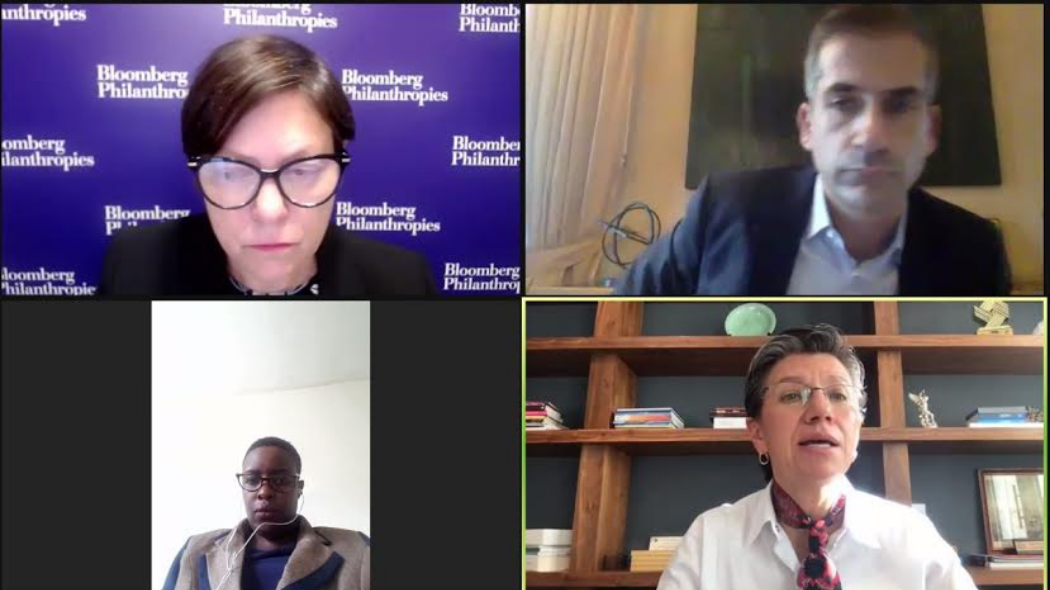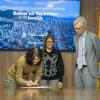To commemorate World Cities Day 2020, the Partnership for Healthy Cities alliance supported by the World Health Organization, Bloomberg Philantrophies and Vital Strategies, organized the event COVID-19 and beyond: Cities on the front lines of a healthier future.
With the participation of the Director General of the World Health Organization, Tedros Adhanom Ghebreyesus, the founder of Bloomberg Philanthropies and former Mayor of New York, Michael R. Bloomberg; as moderator, Kelly Henning, Bloomberg Philanthropies Public Health Leader; the president and executive director of Vital Strategies José Luis Castro; Etienne Krug, Director of the Department of Social Determinants of Health of the World Health Organization; Deputy Mayor of the City of Kampala Doreen Nyanjura; the mayor of Athens, Kostas Bakoyannis and Claudia López, mayor of Bogotá.
Tedros Adhanom Ghebreyesus, WHO director general, explained the presence of the guests, “The mayors of today's meeting have been champions of urban health, they have taken bold and necessary actions to save the lives of their citizens; On the one hand, Athens has protected the health of the most vulnerable, providing them with shelters, food and health services; while Bogotá has committed itself to safe mobility, giving importance to cycling and walking. "
Tedros Adhanom began the session by recognizing Bogotá's commitment to promoting the use of bicycles as a biosecure mechanism for mobility. This commitment by the Colombian capital is fundamental in projects such as the Green Corridor of the seventh street, one of the main in the city, which seeks to improve the well-being and health of citizens while advancing with the climate agenda.
José Luis Castro, stressed that COVID-19 has demanded more attention in urban leadership in health since more than 50% of the world population lives in cities, "Cities are the places where health can be produced or compromised ”.
For her part, Kelly Henning, before giving the floor to the participants, said, “The virus is not something that happens and happened; the virus is now our new long-term reality. "
Deputy Lord Mayor Doreen Nyanjura explained that in the case of the city of Kampala, civic culture has played a key role, “There is a lot of confinement fatigue here, human nature is pushed to the limit when it cannot be socialized, but the social contract of protecting yourself and others is more important; that is why in Kampala the facts have been above the popular measures ”.
During her turn, the mayor of Bogotá Claudia López, spoke about the challenges of complying with social isolation, also about how she had to face the problems that made the pandemic visible, such as hidden poverty, “The best decision was also one of the toughest, although the quarantine allowed us to improve the health system and bought us valuable time, this was a very big effort in a city as densified and as unequal as Bogotá ”, and explained how the city had to accelerate its social agenda to implement projects that will support the more vulnerable families, with programs such as The Basic Income, to provide a minimum resource to the poorest families in Bogotá.
To the question of the moderator, "What kind of interaction has Bogotá had with other cities to find solutions?" The Mayor spoke about the importance of taking the opportunities that the pandemic gave Bogotá to change and improve, “Citizen culture is in the DNA of the city, and although no one has the perfect solution, there are certain points that for us have been fundamental to managing the crisis. The first, follow the facts; second, tell people the truth; third, make decisions; fourth use the best knowledge; fifth give simple and clear instructions to the public; sixth build trust ”.
López also spoke about the need to implement educational and labor programs for women, who are at the center of the strategy proposed in the District Development Plan and who seek to generate greater economic and social opportunities through the increase of policies that benefit women.
At the close of the event, a brief recount was made of what was discussed in the forum and it was concluded by consensus that the pandemic knows no limits and that for this reason it is key to emphasize the use of Open Data and digital services as a an indispensable measure to address the health crisis that the coronavirus has generated in the world.
To read this article in spanish, click here.






